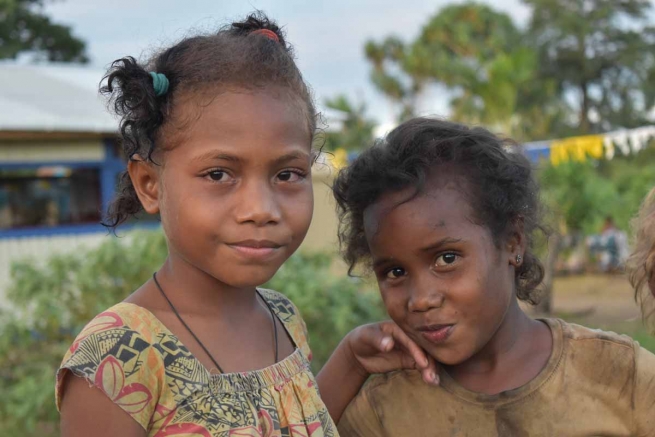SOLOMON ISLANDS: Don Bosco Technical Institute launches new program providing education to youth living near the Ranadi dumps in Honiara

(MissionNewswire) The Don Bosco Technical Institute Henderson, located in Honiara, the capital city of the Solomon Islands, launched a new project in 2019 to provide education to children living near the Ranadi dump site in a suburb east of Honiara. The families who live there experience high rates of poverty, unemployment and illiteracy and most spend their days at the dump collecting materials that can be recycled.
Children are very often working with their parents which prevents them from regularly attending school and receiving an adequate education. Due to the unsanitary conditions of the dump, the hygiene of these children and their families is precarious and negatively impacts their health.
Since March, Salesians missionaries have been teaching courses to children, between the ages of 4 and 13, to read and write and to refine their calculation skills. Upwards of 70 students attend these lessons. Courses are also organized for older children who want to specialize in welding or manufacturing or work in the hotel sector. To date, there have been about 25 applications to participate in these lessons.
The Salesian courses are aimed at raising awareness among parents so that they understand the importance of giving their children a proper education and are motivated to send them to school instead of working in landfills.
In order to help the families replace the income that the children made while working, the Don Bosco Technical Institute has also created a program aimed specifically at mothers which allows them to use the institute’s land to grow vegetables which they can then sell back to the market.
The Don Bosco Technical Institute has been providing education and skills training in the electrical, automotive, carpentry and machine fitting maintenance trades as well as life skills training and employment assistance for more 250 students over the last 16 years.
While the majority of students are male, the institute has been working to increase the enrollment of female students by encouraging them to take courses in more typically male-dominated trades as well as providing opportunities for those who previously left school due to marriage or pregnancy. Currently, most young women begin at the institute with life skills training followed by courses in teaching and nursing.
“Most of the students at the Don Bosco Technical Institute are from poor families and many have dropped out of traditional schools,” says Father Mark Hyde, director of Salesian Missions, the U.S. development arm of the Salesians of Don Bosco. “There, they are getting a second chance by learning skills that will enable them to find employment to support themselves and their families.”
About 12.7 percent of the population of the Solomon Islands lives below the poverty line. Roughly 20 to 25 percent of youth in the country never attend primary school with 30 percent of those attending never completing. Limited access to education and an adult literacy rate of less than 35 percent perpetuate the cycle of poverty from generation to generation.
Eighty-four percent of Solomon Islanders reside in rural areas and rely on subsistence farming for their livelihoods. Access to healthcare and other social services is very limited and the poor to non-existent access to reliable transport, electricity and telecommunications infrastructure compounds already challenging economic conditions. With the majority of youth living in remote areas with limited educational and employment prospects, overcoming poverty is an uphill battle.
###
Sources:
ANS Photo (usage permissions and guidelines must be requested from ANS)
ANS – Solomon Islands – A project with teens and children of Ranadi dumps
UNICEF – Solomon Islands
Salesian Missions – Solomon Islands




